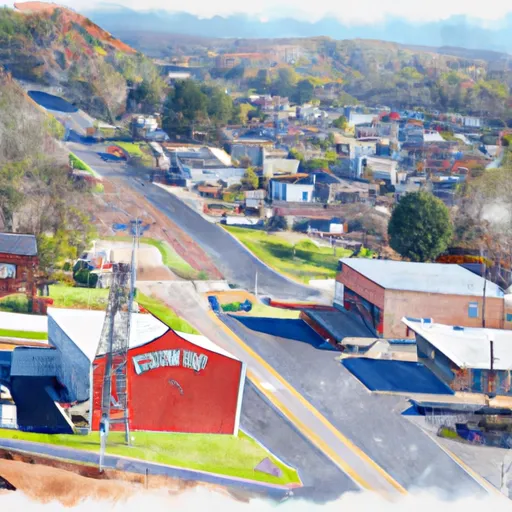-
 Snoflo Premium
Snoflo Premium
Get unlimited access to all our content
With no Ad interruptions! - Start Your Free Trial Login with existing account
Rossville
Eden Index
Climate
7.8
•
Recreation
4.6
•
Community
2.3
•
Safeguard
5.3/10

Rossville, Georgia is a small city located in the northwest corner of the state, near the Tennessee border. The city experiences a humid subtropical climate, characterized by hot and humid summers, mild winters, and ample rainfall throughout the year. Summers in Rossville are typically hot, with temperatures often exceeding 90°F (32°C), and occasional thunderstorms. Winters are milder, with temperatures averaging around 40-50°F (4-10°C), and occasional snowfall.
The hydrology of Rossville is heavily influenced by the nearby Tennessee River system. Several creeks and streams flow through the area, contributing to the overall hydrological balance. The water quality is generally good, although there are concerns about pollutants from urban and agricultural runoff.
Outdoor recreation opportunities abound in Rossville and its surrounding areas. The city is nestled amidst picturesque landscapes, offering access to numerous trails, parks, and natural areas. Nearby Lookout Mountain provides fantastic hiking and rock climbing opportunities, with stunning views of the surrounding valleys. The Tennessee River and nearby Chickamauga Lake offer boating, fishing, and other water sports. Overall, Rossville is an ideal destination for nature enthusiasts and outdoor adventurers seeking to explore the beauty of Georgia's northwest region.
What is the Eden Index?
The Snoflo Eden Index serves as a comprehensive rating system for regions, evaluating their desirability through a holistic assessment of climate health, outdoor recreation opportunities, and natural disaster risk, acknowledging the profound impact of these factors on livability and well-being.
Climate Health Indicator (CHI): 7.8
Rossville receives approximately
1331mm of rain per year,
with humidity levels near 85%
and air temperatures averaging around
15°C.
Rossville has a plant hardyness factor of
7, meaning
plants and agriculture in this region tend to thrive during the non-winter months.
By considering the ideal temperature range, reliable water supplies, clean air, and stable seasonal rain or snowpacks, the Climate Health Indicator (CHI) underscores the significance of a healthy climate as the foundation for quality living.
A healthy climate is paramount for ensuring a high quality of life and livability in a region, fostering both physical well-being and environmental harmony. This can be characterized by ideal temperatures, reliable access to water supplies, clean air, and consistent seasonal rain or snowpacks.
Weather Forecast
Streamflow Conditions
Middle Tennessee-Hiwassee
Area Rivers
Middle Tennessee-Hiwassee
Snowpack Depths
Middle Tennessee-Hiwassee
Reservoir Storage Capacity
Middle Tennessee-Hiwassee
Groundwater Levels
Recreational Opportunity Index (ROI): 4.6
The Recreational Opportunity Index (ROI) recognizes the value of outdoor recreational options, such as parks, hiking trails, camping sites, and fishing spots, while acknowledging that climate plays a pivotal role in ensuring the comfort and consistency of these experiences.
Access to outdoor recreational opportunities, encompassing activities such as parks, hiking, camping, and fishing, is crucial for overall well-being, and the climate plays a pivotal role in enabling and enhancing these experiences, ensuring that individuals can engage in nature-based activities comfortably and consistently.
Camping Areas
| Campground | Campsites | Reservations | Toilets | Showers | Elevation |
|---|---|---|---|---|---|
| Chewacla State Park | None | 516 ft | |||
| R Shaefer Heard | None | 640 ft | |||
| Pyne Road Park | 24 | 711 ft | |||
| Whitetail Ridge | None | 694 ft | |||
| Amity | None | 689 ft | |||
| Burnt Village | 120 | 687 ft | |||
| Spring Villa Campground | 24 | 604 ft | |||
| John Tanner State Park | None | 1,094 ft | |||
| Blanton Creek Park | 50 | 561 ft | |||
| Brush Creek County Park | None | 693 ft |
Nearby Ski Areas
Catastrophe Safeguard Index (CSI):
The Catastrophe Safeguard Index (CSI) recognizes that natural disaster risk, encompassing floods, fires, hurricanes, and tornadoes, can drastically affect safety and the overall appeal of an area.
The level of natural disaster risk in a region significantly affects safety and the overall livability, with climate change amplifying these risks by potentially increasing the frequency and intensity of events like floods, fires, hurricanes, and tornadoes, thereby posing substantial challenges to community resilience and well-being.
Community Resilience Indicator (CRI): 2.3
The Community Resilience Indicator (CRI) recognizes that education, healthcare, and socioeconomics are crucial to the well-being of a region. The CRI acknowledges the profound impact of these elements on residents' overall quality of life. By evaluating educational resources, healthcare accessibility, and economic inclusivity, the index captures the essential aspects that contribute to a thriving community, fostering resident satisfaction, equity, and social cohesion.

